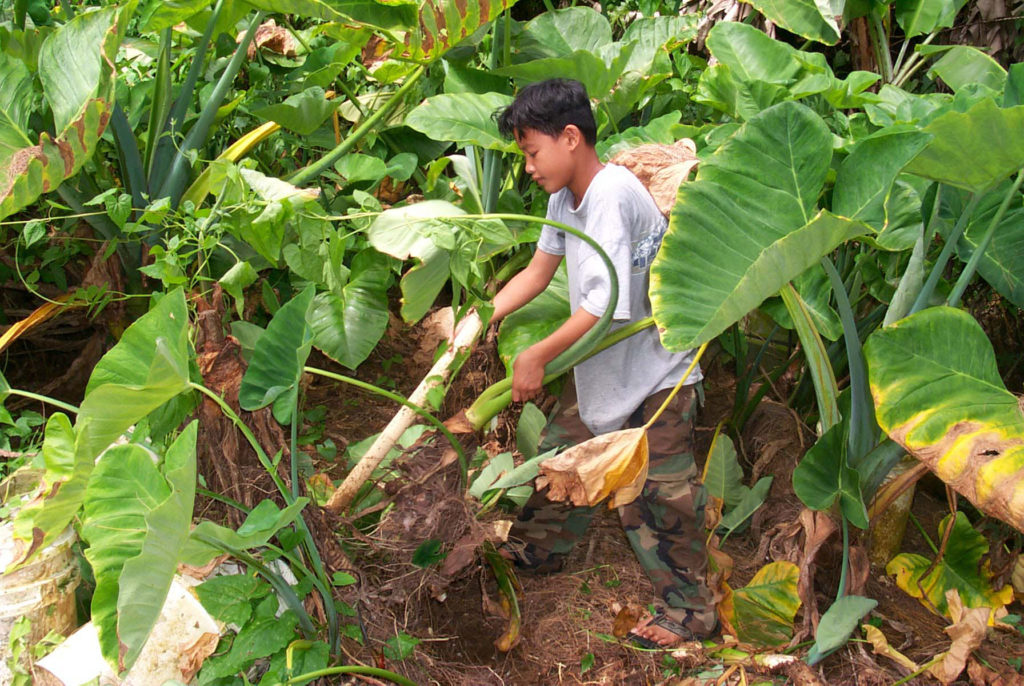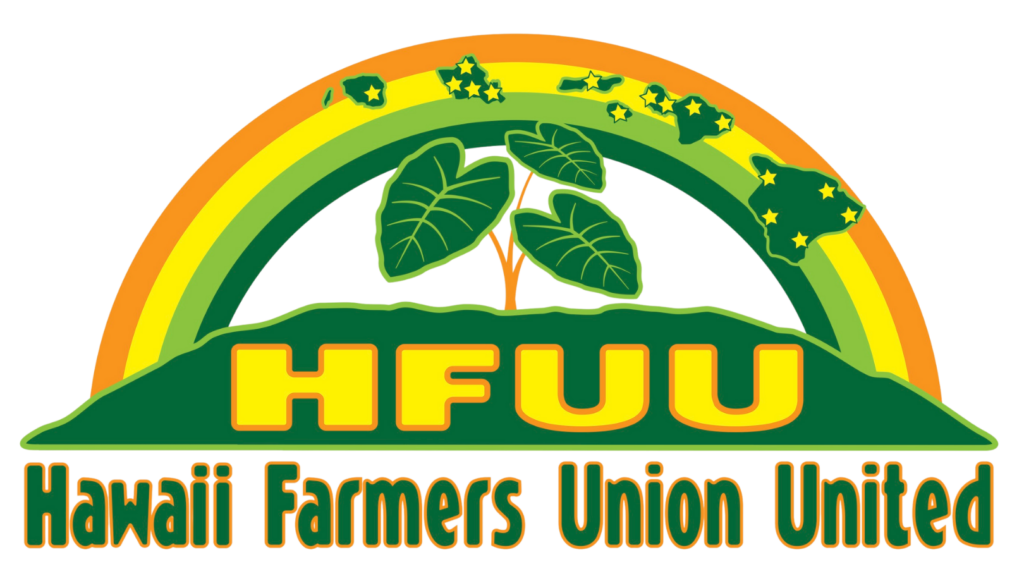
A Passion for Conservation
The heat of the afternoon sun takes a heavy toll when you are out in the field working your kalo.
However, it is time well spent knowing you are providing fresh local food for your community
and caring for the land, ecosystems, and the future.
Partnering with the Natural Resources Conservation Service (NRCS), farmers, ranchers, and
private forest owners and managers can receive technical information and assistance and
financial assistance for implementing conservation activities.
In the Pacific Islands Area (PIA), the mission is clearly defined:
“We deliver conservation solutions so agricultural producers can protect natural resources and
feed a growing world.”

The Farm Bill
The Farm Bill, first created to help struggling farmers in the 1930s, provides assistance related
to food and farms. Through its conservation provisions, NRCS and other United States
Department of Agriculture (USDA) Agencies work with America’s farmers and ranchers to
protect our soil, water, and other natural resources.
“The challenges that farmers and ranchers face require innovative solutions to support their
continued ability to produce the food and fiber we all depend on,” says J.B. Martin, NRCS
Pacific Islands Area Acting Director. “Invasive species are a continual problem, from strawberry
guava in our forests to the two-lined spittle bug and other pests. Climate change has led to more
extreme weather and less available water for agriculture. At the same time, we are seeing
opportunities for growth. Urban farming has increased, along with an interest in local foods and
resilient food systems. We’re eager to help our nation’s farmers and ranchers address these
challenges and opportunities, and science and innovation will help get us there.”
How to Get Started
NRCS offers to assist private landowners and agricultural producers interested in managing
their natural resources in a sustainable manner. Through voluntary technical and financial
assistance programs, the agency helps producers plan and implement conservation practices to
address soil, water, plant, air, animal, and related natural resource concerns or help save
energy, agricultural land, and non-industrial private forest land.
An NRCS conservationist will evaluate the natural resources on the producer’s land at no cost
and provide personalized advice and information based on sound science to help the producer
make informed decisions that support both production and conservation goals. If a producer or
rancher chooses to take the next step toward improving their conservation practices, NRCS can
work with them to develop a conservation plan and identify opportunities for financial assistance
through various conservation programs.
Environmental Quality Incentives Program (EQIP)
The Environmental Quality Incentives Program offers financial assistance to address natural
resource concerns and deliver environmental benefits such as improved water and air quality, conserved ground and surface water, increased soil health and reduced soil erosion and
sedimentation, improved or created wildlife habitat, and mitigation against increasing weather
volatility. EQIP participants install or implement structural, vegetative, and management
practices such as improving irrigation efficiency, restoring pasture, or nutrient and pest
management on eligible agricultural land and non-industrial private forestland.
Conservation Stewardship Program (CSP)
The Conservation Stewardship Program is a comprehensive working lands conservation
program designed to help farmers and ranchers protect and improve their existing conservation
systems. CSP enrolls whole farms and offers farmers the opportunity to earn payments for
actively managing, maintaining, and expanding conservation activities like cover crops,
rotational grazing, ecologically-based pest management, buffer strips, and the transition to
organic farming, in concert with their production activities.
Agricultural Management Assistance Program (AMA)
The Agricultural Management Assistance helps agricultural producers manage financial risk. In
Hawai’i, producers may apply for AMA funding to install seasonal high tunnels and associated
practices to help extend their growing period.
Agricultural Conservation Easement Program (ACEP)
The Agricultural Conservation Easement Program helps to protect working farms and ranches,
wetlands, and grasslands through long-term easements. ACEP has two components: Wetland
Reserve Easement (WRE) and Agricultural Land Easement (ALE). The WRE component
restores, protects, and enhances wetland value and function on wetlands.
The ALE component protects farms and ranches from development, specifically to ensure farm
viability for future generations, and to conserve grazing land.
Regional Conservation Partnership Program (RCPP)
Through the Regional Conservation Partnership Program NRCS co-invest with partners to
implement conservation to address conservation challenges and provide measurable
improvements and outcomes. RCPP projects may include a range of on-the-ground
conservation activities such as cover cropping and nutrient management implemented by
farmers, ranchers, and forest landowners.
Conservation Innovation Grants (CIG)
Conservation Innovation Grants, a sub-program of EQIP, funds innovative conservation projects
that use creative problem solving and on-farm research to promote science-based solutions to
benefit farmers and the environment. CIG partners work to address our nation’s water quality,
air quality, soil health, and wildlife habitat challenges.
For more information about conservation and NRCS programs, contact your local NRCS
Service Center or visit www.pia.nrcs.usda.gov.

HFUU is composed of 15 Chapters across the Hawaiian Islands. We are represented with a seat on the Hawaii Board of Agriculture.
Our Members are Farmers Union made up of farmers, gardeners, and folks that purchase and consume locally produced products!
We are a grassroots producer-driven organization with leadership demonstrating support for family agriculture as the basis for thriving rural communities. Those communities, in turn, are vital to the health and economic well-being of the entire U.S. economy.
For more information, please visit our website or contact us today!
